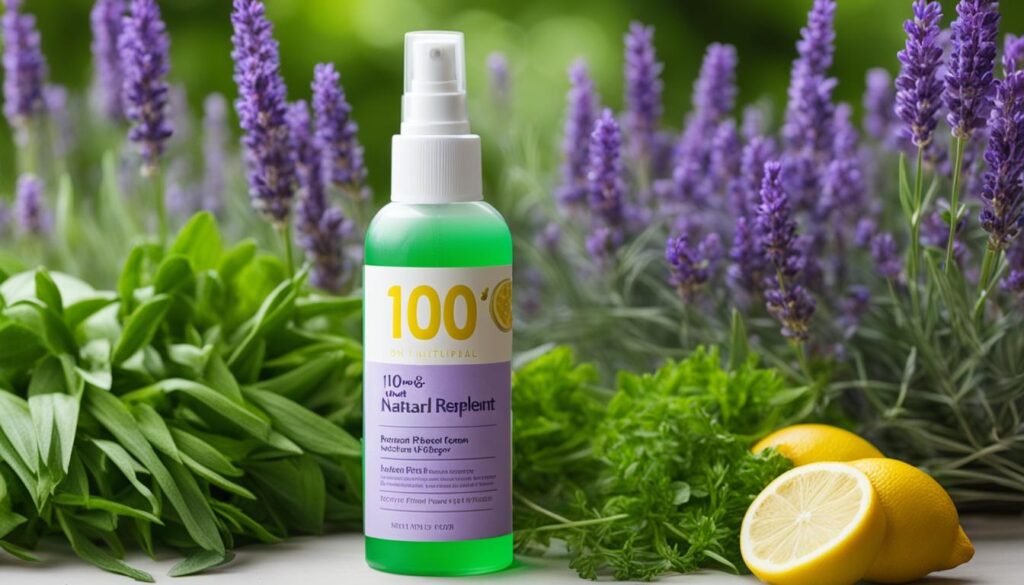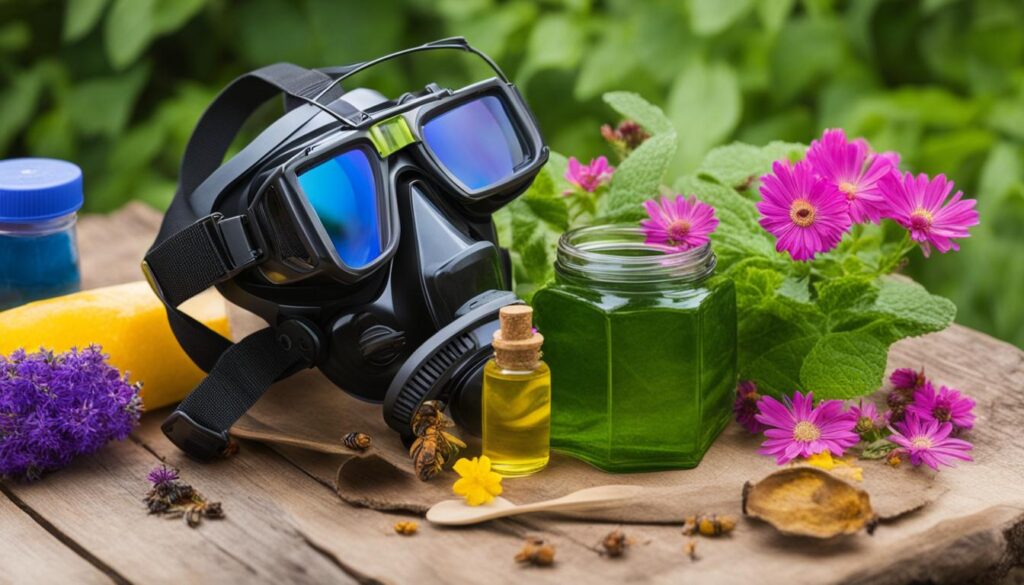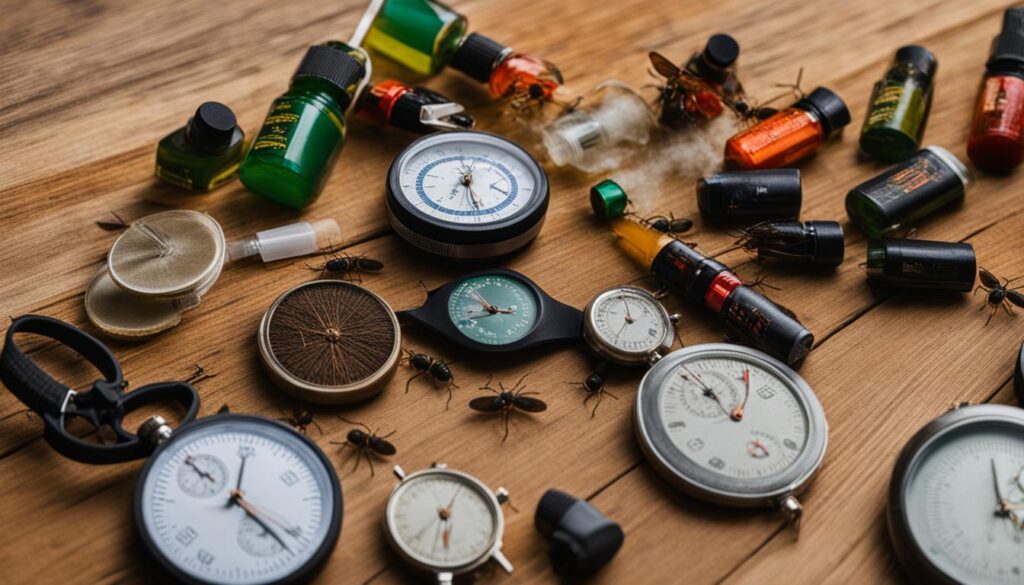Insects can be a real nuisance, especially during the summer months when they are at their peak activity. Mosquitoes, ants, flies, and other pesky bugs can disrupt outdoor gatherings and make it difficult to enjoy your time outside. While there are many commercial insect repellents available on the market, some people prefer to steer clear of products that contain harsh chemicals.
If you’re looking for a natural and safer alternative to keep bugs at bay, homemade insect repellents can be the answer. By using simple ingredients that you can find in your pantry or garden, you can create effective bug repellents that are both eco-friendly and non-toxic.
In this article, I will explore various homemade natural insect repellents that can help you stay bug-free without relying on chemicals. From essential oils and herbs to common household items, we will uncover the secrets of DIY bug sprays that are gentle on your skin and kind to the environment.
Key Takeaways:
- Homemade natural insect repellents offer a safer alternative without harsh chemicals.
- Ingredients like essential oils, herbs, and common household items can be used to create DIY bug sprays.
- Some natural ingredients, such as citronella oil and mint, have insect-repelling properties.
- Homemade bug sprays can be effective but may not be as potent as synthetic options in severe infestations.
- Integrating natural and synthetic approaches can provide comprehensive bug control solutions.
Natural Ingredients for Repelling Mosquitoes
When it comes to keeping mosquitoes at bay, natural ingredients can be your best ally. One such ingredient is citronella oil, renowned for its mosquito-repellent properties. By harnessing the power of citronella oil, you can create a homemade mosquito repellent spray that effectively keeps these pesky insects away.
Creating your own DIY bug spray is simple. Just dilute citronella oil with water and apply it to your skin. The powerful scent of citronella acts as a natural deterrent, making it an excellent choice for those seeking a chemical-free mosquito repellent option.
But citronella oil is not the only essential oil that can repel mosquitoes. Lemon eucalyptus and basil are also effective ingredients to include in your homemade bug spray. These oils possess natural properties that mosquitoes find unappealing, providing you with additional protection against their bites. Plus, the fresh, invigorating scents of lemon eucalyptus and basil add a pleasant fragrance to your repellent.
DIY Bug Spray Recipe with Citronella Oil
Here’s a simple recipe for a homemade bug spray that incorporates the power of citronella oil:
Ingredients:
- 1 cup water
- 2 tablespoons citronella oil
- 1 tablespoon witch hazel (optional)
Instructions:
- Mix all the ingredients together in a spray bottle.
- Shake well to ensure the oils are blended properly.
- Apply the spray to your skin before spending time outdoors.
Note: You can adjust the measurements according to your preference, but be sure to maintain the correct ratio of water to citronella oil, as too much or too little oil may affect the effectiveness of the bug spray.
With this DIY bug spray, you can enjoy the great outdoors without worrying about pesky mosquito bites. Not only is it effective, but it also offers a natural alternative to chemical-laden mosquito repellents commonly found in stores.
Next time you plan a picnic or an evening stroll, don’t forget to grab your homemade bug spray with citronella oil. Stay protected and enjoy a bug-free experience!
Repelling Ants and Flies with Common Household Items
When it comes to keeping ants and flies at bay, you don’t need to rely on harsh chemicals. Instead, you can turn to common household items that are natural, effective, and safe. In this section, I’ll show you how you can use chalk, mint, and basil to repel these pesky insects and keep your home insect-free.
Creating a Chalk Barrier
If you’re dealing with ants or slugs invading your home, chalk can be your secret weapon. These pests are reluctant to cross a chalk barrier, making it an easy and affordable solution. Simply sprinkle a line of chalk powder or draw a barrier with chalk around entry points such as doorways, windowsills, or cracks. This acts as a natural deterrent and helps keep ants and slugs from entering your living space. So, grab a piece of chalk and defend your home against these unwanted intruders.
Mint and Basil: Natural Insect Repellents
Another effective way to repel ants and flies is by harnessing the power of nature’s own insect-repellent herbs – mint and basil. These aromatic plants not only add flavor to your favorite dishes but also serve as natural insect repellents.
One way to use mint and basil is by planting them near doors and windows. The strong scent of these herbs acts as a deterrent, keeping ants and flies away from the entry points of your home. You can also create a DIY insect repellent using mint or basil. Simply crush a handful of fresh mint leaves or basil leaves and mix them with water. Strain the mixture and pour it into a spray bottle. Spray this natural repellent around areas where ants and flies tend to gather, such as countertops or outdoor seating areas. The refreshing aroma will repel these insects while leaving a pleasant scent in your home.
| Common Household Item | Insect it Repels |
|---|---|
| Chalk | Ants and slugs |
| Mint | Ants and flies |
| Basil | Ants and flies |
With the help of chalk, mint, and basil, you can keep ants and flies at bay without relying on harsh chemicals. These natural remedies not only repel insects but also add a touch of freshness to your surroundings. Embrace the power of common household items and enjoy an insect-free home.

Homemade Bug Sprays for Skin Protection
When it comes to protecting your skin from pesky bugs, homemade bug sprays can be a game-changer. Not only do they repel insects effectively, but they also offer a safer alternative to chemical-laden sprays. One common base ingredient in DIY bug sprays is witch hazel. By combining witch hazel with essential oils like lemongrass, peppermint, or citrus oils, you can create a powerful DIY bug spray for skin protection.
Witch hazel, derived from the bark and leaves of the witch hazel plant, has long been revered for its astringent properties. It helps to tighten the skin pores, making it more difficult for insects to land and bite. This natural ingredient acts as a gentle yet effective base for your bug spray.
Adding essential oils to witch hazel enhances the bug-repelling properties of your DIY spray. Lemongrass oil, for example, is known for its strong scent that bugs find repulsive. Peppermint oil and citrus oils like lemon and orange are also effective in repelling bugs.
Creating your own DIY bug spray is simple. Here’s a basic recipe to get started:
- Mix 1 cup of witch hazel with 10-15 drops of essential oils (such as lemongrass, peppermint, or citrus oils) in a spray bottle.
- Shake well to blend the ingredients thoroughly.
- Apply the spray to exposed skin, avoiding contact with eyes and mouth.
It’s important to note that essential oils can vary in strength and potency. Some people may be more sensitive to certain oils, so it’s essential to do a patch test before applying the spray liberally.
Tip: If you prefer a milder scent, you can dilute the essential oils with a carrier oil like coconut oil or olive oil. This can also provide additional moisturizing benefits to your skin.
Using homemade bug sprays not only helps protect your skin from bug bites but also gives you peace of mind knowing that you’re using natural ingredients. By harnessing the power of witch hazel and essential oils, you can enjoy the great outdoors without worrying about harsh chemicals or unwanted insect encounters.
So, give DIY bug sprays a try this summer and experience the benefits of natural skin protection.
Why Choose Homemade Bug Sprays?
There are several reasons why homemade bug sprays are a great choice:
- Natural Ingredients: Homemade bug sprays use natural ingredients like witch hazel and essential oils, making them a healthier option for your skin.
- Eco-Friendly: By avoiding chemical-laden bug sprays, you’re reducing your impact on the environment.
- Cost-Effective: DIY bug sprays are often more budget-friendly compared to store-bought options.
- Customizable Formulas: You have the flexibility to experiment with different essential oil combinations to find the scent that works best for you.
By choosing homemade bug sprays, you can enjoy the benefits of effective bug protection while embracing a natural and eco-friendly approach.
Using Herbs for Natural Insect Repellents
If you prefer not to use essential oils, you can create herbal bug sprays using dried or fresh herbs. Mint, basil, lavender, and other herbs can be steeped in boiling water to create a natural insect repellent. These herbal sprays can be kept in the fridge for a refreshing and effective way to repel bugs.
Herbs have long been used for their aromatic properties and natural repellent abilities. By harnessing the power of herbs, you can create a herbal bug spray that not only keeps pesky insects at bay but also adds a pleasant fragrance to your surroundings.
Why Choose Herbal Bug Sprays?
Herbal bug sprays offer a natural and non-toxic alternative to chemical-laden insect repellents. They are free from synthetic fragrances, harmful additives, and harsh chemicals, making them an environmentally-friendly choice for both you and the ecosystem.
Using dried or fresh herbs in bug sprays not only helps repel insects but also provides additional benefits. Many herbs have antimicrobial and anti-inflammatory properties, soothing insect bites and preventing infections. They are also rich in antioxidants, which can nourish and protect your skin.
Creating Your Herbal Bug Spray
To create your own herbal bug spray, follow these simple steps:
- Choose your herbs: Select dried or fresh herbs such as mint, basil, lavender, rosemary, or citronella. These herbs are known for their insect-repelling properties.
- Prepare the mixture: Bring a pot of water to a boil and add a generous amount of your chosen herbs. For dried herbs, use approximately 1/4 cup per 2 cups of water. If using fresh herbs, double the amount.
- Steep the herbs: Let the mixture simmer for about 15-20 minutes, allowing the herbs to release their natural oils. Stir occasionally to ensure the herbs are evenly distributed.
- Strain the liquid: After steeping, strain the liquid to remove any herb particles, leaving you with a clear bug-repellent solution.
- Bottle and store: Pour the herbal spray into a spray bottle and keep it in the fridge for a refreshing and cooling effect. Remember to label the bottle with the ingredients and date of preparation.
Applying Herbal Bug Spray
To use your herbal bug spray effectively, follow these tips:
- Shake the bottle before each use to ensure the herbs are evenly distributed.
- Spray the repellent onto exposed skin, clothing, and other areas where insects are likely to bite.
- Reapply the spray every few hours or after swimming or sweating excessively.
- Keep the spray away from your eyes and mouth, as some herbs may cause irritation.
Enjoy the benefits of herbal bug sprays and stay protected from pesky insects the natural way.

Safety Precautions and Tips for Homemade Insect Repellents
When using homemade insect repellents, it’s important to take certain precautions to ensure your safety and maximize their effectiveness. Here are some tips to keep in mind:
1. Patch Test for Allergic Reactions
Before using homemade insect repellents liberally, it’s crucial to perform a patch test to check for any allergic reactions. Apply a small amount of the repellent to a small area of your skin and wait for 24 hours to see if there are any adverse reactions. If you experience redness, itching, or irritation, discontinue use immediately.
2. Protect Your Clothing
Some homemade bug sprays may stain clothing due to the natural ingredients used. To prevent any potential stains, avoid applying the repellent directly to your clothing. Instead, focus on applying it to exposed areas of your skin.
3. Allow the Spray to Dry
Homemade bug sprays may have a strong odor when initially applied. To minimize this odor and ensure the effectiveness of the repellent, allow it to fully dry before putting on any clothing or going outdoors. This will also help prevent the repellent from rubbing off easily.
4. Label and Store Appropriately
To maintain the effectiveness of your homemade insect repellents, it’s important to store them properly. Label your mixture with the ingredients and the date of preparation. Store the repellent in a dark-colored bottle or keep it in a dark spot, as exposure to light can degrade the ingredients and reduce its efficiency over time.
5. Consider Other Precautions
While homemade insect repellents can be effective, it’s still important to take additional precautions to prevent insect bites. Wearing long sleeves, using mosquito nets, and avoiding outdoor activities during peak mosquito hours can further reduce your risk of insect bites.
By following these safety precautions and tips, you can ensure a safer and more effective experience with homemade insect repellents.

Effectiveness of Natural Insect Repellents
The effectiveness of natural insect repellents can vary depending on the ingredients used. Bug repellent testing has shown that while some plant-based oils, such as lemongrass oil, citronella oil, and soybean oil, can provide some level of protection against bugs, they are generally less effective compared to synthetic options.
Repellents containing active ingredients like oil of lemon eucalyptus and picaridin have been found to be more effective in bug repellent testing. These ingredients have shown a higher success rate in repelling insects and have been registered with the Environmental Protection Agency (EPA) for their effectiveness.
Comparison of Natural vs. Synthetic Repellents
To help you understand the effectiveness of natural insect repellents, let’s compare the results of bug repellent testing for natural and synthetic options. The table below provides a summary of the findings:
| Repellent Type | Effectiveness |
|---|---|
| Natural Repellents | Varies depending on the ingredients used |
| Synthetic Repellents | Generally more effective in repelling insects |
As seen from the table, synthetic repellents, such as those containing DEET, have been extensively tested and proven to be highly effective in bug repellent testing. While natural repellents offer a more environmentally friendly option, synthetic options may be necessary for severe infestations or persistent bug problems.
It’s important to note that effectiveness can also depend on factors such as the concentration of active ingredients and application methods. Always follow the instructions provided by the manufacturer to maximize the repellent’s effectiveness.

In conclusion, while natural insect repellents have their benefits, such as being non-toxic and eco-friendly, bug repellent testing suggests that synthetic options may offer greater effectiveness. However, it’s always a good idea to consider your individual needs and preferences when choosing an insect repellent. Consult with a professional pest control service if you require assistance in dealing with severe infestations or persistent bug problems.
Understanding the Role of EPA Registration
EPA registration plays a crucial role in ensuring the safety and effectiveness of bug repellents. When a bug repellent is registered with the Environmental Protection Agency (EPA), it means that it has undergone evaluation by federal regulators to assess its efficacy and potential risks. Choosing bug repellents with EPA registration provides assurance that they have met stringent standards for both safety and effectiveness in repelling insects.
Bug repellents that have undergone EPA registration have been found to provide long-lasting protection against bug bites. The rigorous testing and evaluation process conducted by the EPA help determine the efficacy of these repellents, ensuring that they effectively repel insects and prevent bug-related diseases.
By opting for EPA-registered bug repellents, you can have confidence in their ability to keep insects at bay, allowing you and your family to enjoy outdoor activities without constant annoyance or the worry of bug bites.
Let’s take a look at the benefits of choosing bug repellents with EPA registration:
- Safety: EPA registration confirms that the bug repellent has been tested for potential hazards and is considered safe for use. This provides peace of mind, particularly when applying the repellent to your skin or using it on children.
- Effectiveness: Bug repellents that have undergone EPA registration have demonstrated their effectiveness in repelling insects. The EPA evaluates the repellents based on their ability to deter mosquitoes, ticks, and other pests, ensuring they provide the intended protection.
When using bug repellents, it is essential to prioritize safety and effectiveness by selecting EPA-registered products. Remember to carefully read and follow the instructions on the product label for optimal results.
Benefits of EPA-Registered Bug Repellents
| Benefits | Description |
|---|---|
| Safety | Bug repellents with EPA registration have undergone testing for potential hazards, providing assurance of their safety. |
| Effectiveness | EPA-registered bug repellents have demonstrated their ability to repel insects, offering reliable protection against bug bites. |
Comparing Natural and Synthetic Insect Repellents
When it comes to repelling insects, both natural and synthetic options are available. While natural insect repellents can provide some level of protection, synthetic repellents are often more effective in keeping bugs at bay. It’s essential to understand the differences between these two types of repellents to make an informed choice for your bug-fighting needs.
The Effectiveness of Natural Insect Repellents
Natural insect repellents, such as those derived from essential oils and herbs, offer a chemical-free alternative for insect protection. They are generally safe to use and have a lower likelihood of causing skin irritations or adverse reactions. However, it’s important to note that the effectiveness of natural repellents can vary depending on the specific ingredients used and the concentration of those ingredients.
While natural repellents can provide some protection against insects, studies have shown that they may not be as effective as synthetic options in severe infestations or areas with high bug populations. Some plant-based ingredients, although popular in homemade repellents, have shown lower effectiveness compared to synthetic alternatives.
The Effectiveness of Synthetic Insect Repellents
Synthetic insect repellents, on the other hand, have been extensively tested and proven to be highly effective in repelling a wide range of insects. The most common synthetic repellent is DEET (N,N-diethyl-meta-toluamide), which has been used for decades and is widely recognized as an effective bug repellent.
DEET provides long-lasting protection against mosquitoes, ticks, flies, and other biting insects. It works by confusing the insects’ sense of smell, making it difficult for them to locate and target humans. Synthetic repellents like DEET have been trusted by millions of people worldwide and are considered to be highly effective in preventing bug bites.
Choosing the Right Repellent
When it comes to choosing between natural and synthetic insect repellents, it’s important to consider the level of bug infestation you’re dealing with. For mild bug problems and everyday use, natural options can provide adequate protection while minimizing exposure to harsh chemicals.
However, in areas with severe infestations or persistent bug problems, synthetic repellents may be necessary for long-lasting relief and maximum effectiveness. It’s important to follow the instructions and guidelines provided by the manufacturer when using any type of insect repellent.
“While natural insect repellents can provide some protection, synthetic options are often more effective in repelling insects.”
Ultimately, the choice between natural and synthetic insect repellents comes down to personal preference and individual circumstances. It’s important to find a balance between effectiveness and safety when protecting yourself and your loved ones from pesky bugs.
“Synthetic insect repellents, such as DEET, have been extensively tested and proven to be highly effective in repelling a wide range of insects.”
Integrating All-Natural and Synthetic Approaches
When it comes to effective bug control, integrated pest control is the key. This approach combines the power of all-natural insect repellents and synthetic treatments to tackle infestations comprehensively. While homemade natural insect repellents can help prevent bug problems to a certain extent, severe infestations may require the expertise of professional pest control services. By integrating all-natural repellents with synthetic treatments, you can achieve long-lasting bug control solutions that are both effective and environmentally conscious.
While homemade natural insect repellents offer a safer alternative to chemical-based options, they may not always be sufficient in severe infestations. In such cases, synthetic insect repellents have been extensively tested and proven to be highly effective in repelling insects. Combining the strengths of both approaches allows you to tailor your bug control strategy to the specific needs of your situation.
Advantages of Integrating All-Natural and Synthetic Approaches:
- Enhanced effectiveness in repelling a wide range of insects
- Comprehensive bug control for severe infestations
- Customizable strategy based on specific needs and preferences
- Environmentally conscious approach by minimizing the use of synthetic chemicals
Understanding the strengths and limitations of all-natural insect repellents and synthetic options is crucial in achieving optimal bug control. Integrated pest control provides a holistic and balanced solution that maximizes effectiveness while minimizing environmental impact. By adopting this approach, you can enjoy a bug-free environment and peace of mind.
“Integrating all-natural and synthetic approaches in pest control allows us to achieve a balance between effectiveness and environmental impact, providing long-lasting bug control solutions that meet the needs of our customers.” – Pest Control Expert
| Pest Control Methods | Advantages | Disadvantages |
|---|---|---|
| All-Natural Insect Repellents | – Safer for human and pet contact – Environmentally friendly |
– May be less effective in severe infestations – Limited range of repelled insects |
| Synthetic Insect Repellents | – Highly effective against a wide range of insects – Long-lasting protection |
– Potential risks with prolonged exposure – Environmental impact |
| Integrated Pest Control | – Enhanced effectiveness – Comprehensive bug control – Customizable strategy |
– Requires professional expertise in severe cases – Balancing synthetic and natural approaches |
Benefits of Homemade Natural Insect Repellents
When it comes to repelling insects, homemade natural insect repellents offer a multitude of benefits. Not only are they effective in keeping bugs at bay, but they also provide a safer and more sustainable alternative to chemical-based sprays. Let’s explore the advantages of using these non-toxic, organic, and eco-friendly repellents.
1. Non-Toxic Protection
One of the primary benefits of homemade natural insect repellents is that they are non-toxic. Unlike commercial bug sprays that contain harsh chemicals, homemade repellents utilize ingredients derived from nature. By using natural oils and herbs, you can protect yourself, your loved ones, and your pets from pesky bugs without exposing them to harmful substances.
2. Organic Ingredients
The use of organic ingredients is another advantage of homemade natural insect repellents. These repellents are often made from ingredients that are grown without the use of synthetic pesticides or fertilizers. By choosing organic options, you can reduce your exposure to potentially harmful chemicals and promote a healthier lifestyle.
3. Eco-Friendly Solution
Homemade natural insect repellents are also eco-friendly. The use of organic ingredients and the absence of harsh chemicals minimize the negative impact on the environment. Unlike commercial repellents that can contaminate water sources and harm beneficial insects, homemade repellents contribute to a healthier ecosystem.
In summary, homemade natural insect repellents offer a range of benefits, making them an excellent choice for bug-free summer days. These repellents are non-toxic, organic, and eco-friendly, providing you with effective protection while prioritizing your health and the well-being of the environment.
Conclusion
Homemade insect repellents offer a natural and non-toxic alternative to chemical-based bug sprays. By using ingredients like essential oils, herbs, and common household items, you can create DIY bug repellents that effectively keep bugs at bay. While they may not be as potent as synthetic repellents in severe infestations, these homemade solutions are a safe and eco-friendly way to enjoy a bug-free summer.
With the power of homemade insect repellents, you can confidently protect yourself and your loved ones from pesky bugs without exposing them to harsh chemicals. These natural alternatives provide a healthier option for both you and the environment, reducing your impact on the ecosystem. By embracing DIY bug repellents, you can enjoy the great outdoors without the annoyance and discomfort of bug bites.
So, why not give homemade insect repellents a try? Experiment with different recipes using essential oils, herbs, or household items to find the formula that works best for you. Whether it’s a homemade bug spray or an herbal insect repellent, these natural alternatives will help you stay bug-free and make the most of the summer season. Say goodbye to chemical-laden products and embrace the power of nature in keeping bugs at bay!
FAQ
Are homemade natural insect repellents effective in repelling mosquitoes?
Yes, homemade natural insect repellents can be effective in repelling mosquitoes. Ingredients like citronella oil, lemon eucalyptus oil, and basil can be used to create DIY bug sprays that keep mosquitoes at bay.
Can I use chalk to repel ants and slugs?
Yes, sprinkling chalk around entry points to your home can create a barrier that ants and slugs are reluctant to cross, helping keep these pests away.
How can I repel ants and flies using natural ingredients?
Mint and basil are natural ingredients that repel ants and flies. You can plant these herbs near doors and windows or use them in DIY insect repellents to help keep your home insect-free.
What can I use as a base for homemade bug sprays?
Witch hazel is a commonly used base ingredient for homemade bug sprays. By adding essential oils like lemongrass, peppermint, or citrus oils to witch hazel, you can create an effective DIY bug spray for skin protection.
How can I create herbal bug sprays for insect repellent?
You can steep dried or fresh herbs like mint, basil, or lavender in boiling water to create a natural insect repellent. These herbal sprays can be kept in the fridge for a refreshing and effective way to repel bugs.
Are there any safety precautions when using homemade insect repellents?
Yes, it’s important to do a patch test for possible allergic reactions before using homemade insect repellents liberally. Some essential oils and herbs can be irritating or harmful. Homemade bug sprays may also stain clothing or have a strong odor until they dry.
How effective are natural insect repellents compared to synthetic options?
Natural insect repellents can vary in effectiveness. Some plant-based ingredients have shown lower effectiveness compared to synthetic options. Repellents containing active ingredients like oil of lemon eucalyptus and picaridin have been found to be more effective and are registered with the EPA.
What does EPA registration indicate for bug repellents?
Bug repellents with EPA registration have been evaluated by federal regulators for safety and effectiveness. They have been found to provide long-lasting protection against bug bites.
Can natural insect repellents completely eliminate severe bug infestations?
While natural insect repellents can offer some protection, severe infestations may require the assistance of professional pest control services or synthetic repellents for long-lasting relief.
What are the benefits of homemade natural insect repellents?
Homemade natural insect repellents are non-toxic and do not expose you or the environment to harsh chemicals. They are organic and eco-friendly, providing a healthier alternative to chemical-based bug sprays.
How effective are homemade natural insect repellents in comparison to synthetic options?
While homemade natural insect repellents may not be as potent as synthetic repellents, they offer a natural and non-toxic way to stay bug-free. They can provide some protection but may be more suitable for milder infestations.

